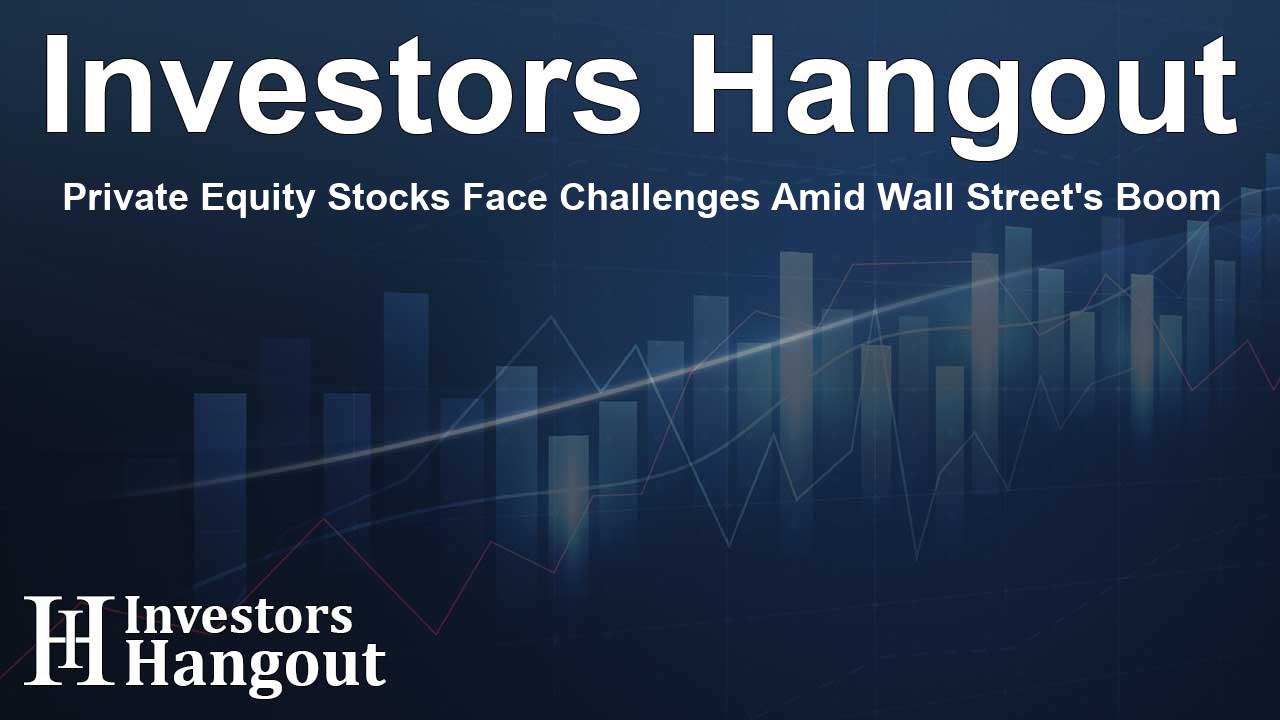Private Equity Stocks Face Challenges Amid Wall Street's Boom

The Current Wall Street Landscape and Private Equity
Wall Street seems to be celebrating an unprecedented bull run, with stocks reaching historic highs every day. Astonishing movements in gold prices, nearing $4,000 per ounce, and Bitcoin (CRYPTO: BTC) climbing beyond $125,000 reveal a fervent marketplace. However, private equity stocks appear to be seated far from this festive scene. Companies like Blackstone Inc. (NYSE: BX), Apollo Global Management Inc. (NYSE: APO), and KKR & Co. Inc. (NYSE: KKR) have experienced sharp declines, diminishing by double digits in just a matter of weeks.
Understanding Recent Market Dynamics
Surprisingly, these downturns arise even as the Federal Reserve revises interest rates downward, hinting at further cuts on the horizon. Given the optimistic environment, why are private equity stocks struggling to keep pace?
Private Equity Under Pressure
The tipping point for the private equity sector occurred recently when a major U.S. auto parts supplier filed for bankruptcy, reporting liabilities exceeding $10 billion. This situation has sent shockwaves throughout the industry.
Expert Analysis
In an insightful discussion with prominent hedge fund manager Jim Chanos, he suggested that the downfall of this supplier may only be an initial warning sign. He highlighted that the private credit market’s structural issues are becoming increasingly apparent and could signal trouble ahead for private equity.
Chanos expressed concerns about a rising trend whereby institutions invest in private credit, which often promises equity-like returns for lower-risk loans. Such high yield expectations raise crucial red flags about the underlying stability of these investments.
Bankruptcy Fallout and Market Implications
The bankruptcy case ignited chaos, particularly as the company was recently marketed as a $6 billion loan opportunity. Jefferies Financial Capital Group Inc. pitched this opportunity, presenting the business as financially secure with $1 billion in cash reserves. However, the reality unfolded rapidly, leading to a situation where their top-tier loans traded at an astonishingly low 33 cents on the dollar.
Furthermore, another entity, Tricolor Holdings, recently collapsed, exacerbating the fears in a market that had already begun to show signs of strain. Reports indicate potential fraudulent activity, such as pledging the same collateral to different lenders, reminiscent of the unethical practices prior to the 2008 financial crisis.
Assessing the Risk on Wall Street
First Brands' downfall showcased how intricate financing mechanisms and overlapping claims can contribute to systemic risks. Interestingly, these are typically not speculative bets made by individual hedge funds but are AAA-rated loans perceived as relatively secure by larger asset managers and pension funds.
Despite the tumult in private equity, Wall Street's appetite for risk remains unyielded. With junk bond spreads at their narrowest point since 2007, many investors may feel emboldened by low-risk premiums.
Future Outlook and Behavioral Trends
Counterintuitively, just days following the bankruptcy tumult, a historic leveraged buyout was set in motion: a staggering $55 billion acquisition of Electronic Arts, which also carried $20 billion in debt. This move suggests that while the surface may appear calm, deep-seated changes and increasing risks are brewing.
The overarching sentiment hints at a growing gap between tangible financial health and market exuberance. Those actively watching the private equity sector should remain vigilant about the potential ripple effects if market conditions worsen further.
Frequently Asked Questions
What impact has the recent bankruptcy had on private equity stocks?
The recent bankruptcy has led to significant declines in the values of leading private equity firms, raising concerns about financial stability.
Why are private equity firms struggling despite favorable market conditions?
Structural issues within the private credit market and rising liability levels have placed pressure on private equity stocks, contrasting sharply with overall market enthusiasm.
What should investors take away from this market trend?
Investors should be cautious about the apparent disconnect between stock market performance and the fragility revealed within the private equity sector.
How are institutional investors reacting to these developments?
Institutional investors continue to assess their risk exposure and may reconsider their investment strategies in light of the private equity challenges.
What future factors may influence the private equity market?
Continuing economic shifts, regulatory changes, and the health of credit markets could significantly impact private equity's trajectory moving forward.
About The Author
Contact Thomas Cooper privately here. Or send an email with ATTN: Thomas Cooper as the subject to contact@investorshangout.com.
About Investors Hangout
Investors Hangout is a leading online stock forum for financial discussion and learning, offering a wide range of free tools and resources. It draws in traders of all levels, who exchange market knowledge, investigate trading tactics, and keep an eye on industry developments in real time. Featuring financial articles, stock message boards, quotes, charts, company profiles, and live news updates. Through cooperative learning and a wealth of informational resources, it helps users from novices creating their first portfolios to experts honing their techniques. Join Investors Hangout today: https://investorshangout.com/
The content of this article is based on factual, publicly available information and does not represent legal, financial, or investment advice. Investors Hangout does not offer financial advice, and the author is not a licensed financial advisor. Consult a qualified advisor before making any financial or investment decisions based on this article. This article should not be considered advice to purchase, sell, or hold any securities or other investments. If any of the material provided here is inaccurate, please contact us for corrections.
